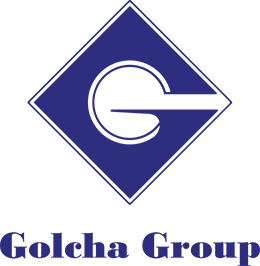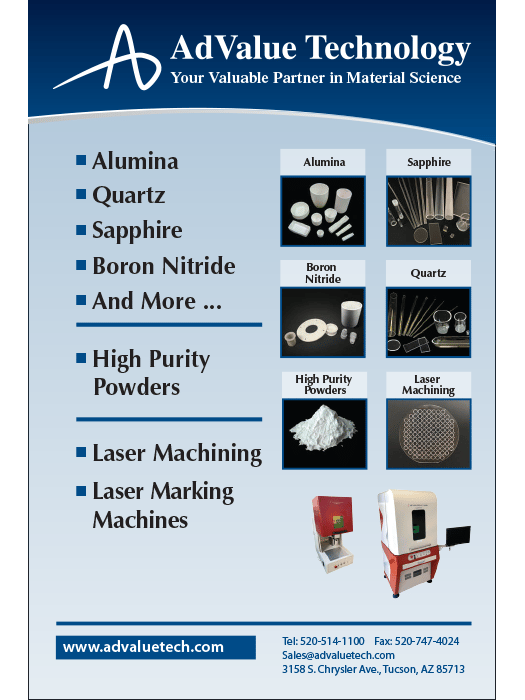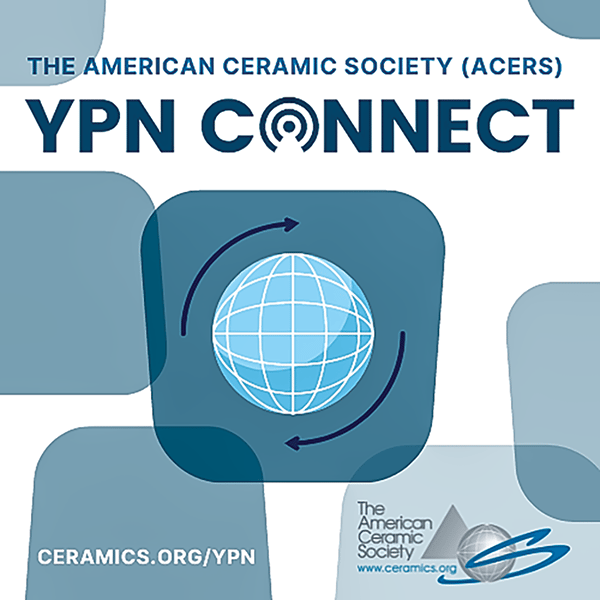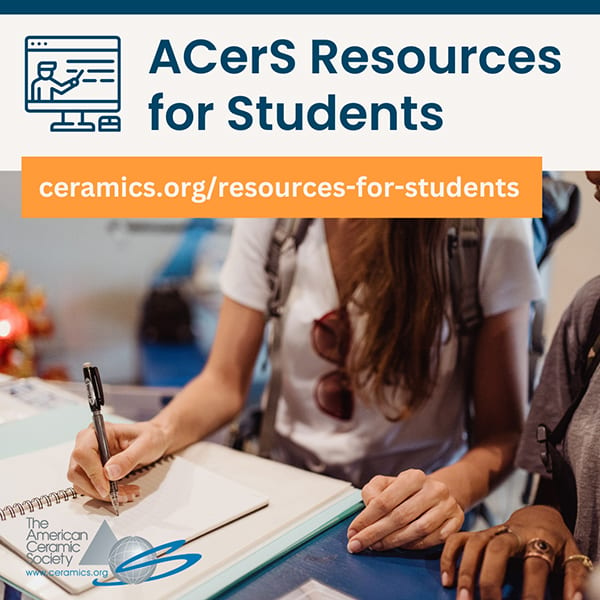acers spotlight
Society/Division/Section/Chapter News
For more information: ceramics.org
Welcome new ACerS Corporate Partner
ACerS is pleased to welcome its newest Corporate Partner, Golcha Group.
To learn about the benefits of ACerS Corporate Partnership, contact Marcus Fish, director of development and industry relations, at 614-794-5863 or mfish@ceramics.org.
Remembering ACerS past president John B. “Jack” Wachtman, Jr.
The American Ceramic Society has lost an esteemed member—John B. “Jack” Wachtman died on Dec. 13, 2023, at the age of 94. He is predeceased by his wife, Edith V. Wachtman. Wachtman joined the National Bureau of Standards (NBS, now the National Institute of Standards and Technology [NIST]) in 1951 as a physicist in the Engineering Ceramics Division. He received his Ph.D. in physics from the University of Maryland in 1961. Wachtman left NBS in 1983 and began a second career as the first director of the Center for Ceramic Research at Rutgers, The State University of New Jersey–New Brunswick. During his 12 years at Rutgers, Wachtman taught courses on characterization and mechanical properties of ceramics intended for seniors and incoming graduate students.
Read Wachtman’s full obituary at https://ceramics.org/memoriam/John-B-(Jack)-Wachtman.
Adrian C. Wright, Distinguished Life Member, 1944–2023
Adrian Carl Wright, ACerS Distinguished Life Member and ACerS Fellow, died on March 22, 2023, at the age of 79. Wright, who dedicated his research career to understanding glass structure, was a member of the Glass & Optical Materials Division and also active in the Society for Glass Technology, where he served as the 49th president from 2002–2004. Wright pioneered use of neutron scattering and modeling studies to understand the structure and dynamics of a wide range of inorganic glasses and other amorphous solids, including silicate, borate, borosilicate, phosphate, chalcogenide, and fluoroberyllate glasses.
Read Wright’s full obituary at https://ceramics.org/memoriam/adrian-c-wright.
Remembering ACerS past president John B. “Jack” Wachtman, Jr.
The American Ceramic Society has lost an esteemed member—John B. “Jack” Wachtman died on Dec. 13, 2023, at the age of 94. He is predeceased by his wife, Edith V. Wachtman.
Wachtman grew up in the small town of Conway, S.C., where he attended public schools. During his early school years, Wachtman was influenced by the discovery of geometry, algebra, and physics. He applied for and received a scholarship from Carnegie Institute of Technology (now Carnegie Mellon University) in Pittsburgh, Pa.
Wachtman received B.S. and M.S. degrees in physics from Carnegie Tech and was a research and teaching assistant there from 1949–1951. Wachtman stated in his memoir that “my time at Carnegie was perhaps the highlight of my life. I loved the intellectual life and companionship of the students. The curriculum was designed to give scientists and engineers some degree of liberal arts education to the extent that this was possible.”
Wachtman joined the National Bureau of Standards (NBS, now the National Institute of Standards and Technology [NIST]) in 1951 as a physicist in the Engineering Ceramics Division. He received his Ph.D. in physics from the University of Maryland in 1961.
Wachtman left NBS in 1983 and began a second career as the first director of the Center for Ceramic Research at Rutgers, The State University of New Jersey–New Brunswick. During his 12 years at Rutgers, Wachtman taught courses on characterization and mechanical properties of ceramics intended for seniors and incoming graduate students.
After retiring from Rutgers, Wachtman wrote books based on the courses he taught. One of these books, Mechanical properties of ceramics, was published in 1996; a revised, second edition that was co-authored with his Rutgers colleagues Roger Cannon and John Matthewson published in 2009. These books were well received, with the first book selling 500 copies in the first six months. According to George Quinn (retired, NIST), these books are by far the best and most balanced textbooks on the topic.
In 1989, Wachtman took on the part-time role as technical editor for ACerS publications, a position he held for 12 years. During this time, his principal focus was on Journal of the American Ceramic Society. In his final year as editor, he, along with ACerS staff, succeeded in putting JACerS online with a subscription system. According to Mark Mecklenborg, ACerS executive director, “Having Dr. Wachtman involved in this process was essential. His knowledge, expertise, and commitment to the Society positioned the journal for success for many years to come.”
One of Wachtman’s final contributions to ACerS was editing the book Ceramic innovations in the 20th century. This book, published in 1999, coincided with the 100th anniversary of the founding of ACerS.
Wachtman collected a multitude of honors from various organizations, including NBS. In his memoir, Wachtman mentioned that the most meaningful honor to him was the election to the International Academy of Ceramics in 1988, as well as serving as president of The American Ceramic Society (1978) and the Federation of Materials Societies (1975). He was a Distinguished Life Member and an ACerS Fellow.
Wachtman was such an inspiration to so many people that it is fitting he ends his memoir with this closing quotation by polymath Albert Schweitzer: “At times our own light goes out and is rekindled by a spark from another person. Each of us has cause to think with deep gratitude of those who have lit the flame within us.”
Editor’s notes:
ACerS appreciates NIST Library for sharing the “Oral history interview of John B. Wachtman,” Feb. 4, 2010, and Wachtman’s 24-page “Memories and reflections on a career as a scientist-engineer in research management, teaching, and editing,” 2009, revised 2010.
Wachtman also featured in the December 1999 Ceramic Bulletin (Vol. 78, No. 12), pp. 36–41, “Profiles in ceramics” by Kathy Woodward.
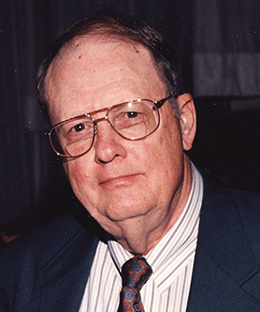
John B. “Jack” Wachtman, Jr.
Adrian C. Wright, Distinguished Life Member, 1944–2023
Adrian Carl Wright, ACerS Distinguished Life Member and ACerS Fellow, died on March 22, 2023, at the age of 79. Wright, who dedicated his research career to understanding glass structure, was a member of the Glass & Optical Materials Division and also active in the Society for Glass Technology, where he served as the 49th president from 2002–2004.
Wright was professor of amorphous solid-state physics at the University of Reading, U.K. He earned his B.Sc. in chemistry, Ph.D. in physical chemistry, and D.Sc. degrees from the University of Bristol, U.K. After completing his Ph.D. studies, he took a position in 1969 at the University of Reading, where he remained until his retirement as professor emeritus in 2007.
He spent three sabbatical years in the United States working at leading institutions, including Xerox Palo Alto Research Center; Stanford Synchrotron Radiation Laboratory; Argonne National Laboratory; University of California, Los Angeles; University of Florida; and New York State College of Ceramics at Alfred University.
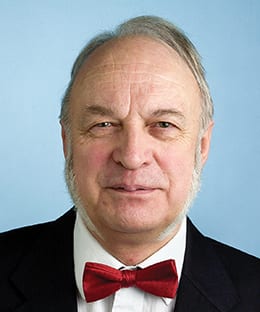
Adrian C. Wright
Wright pioneered use of neutron scattering and modeling studies to understand the structure and dynamics of a wide range of inorganic glasses and other amorphous solids, including silicate, borate, borosilicate, phosphate, chalcogenide, and fluoroberyllate glasses. He had more than 200 publications in the scientific literature, and he sat on the editorial boards of Journal of Non-Crystalline Solids and Fizika i Khimiya Stekla (Soviet/Russian Journal of Glass Physics and Chemistry).
Wright received several prestigious awards, including Fellow in 1995 of both ACerS and the Society of Glass Technology. In 1990, he shared the Worshipful Company of Glass Sellers of London Award, and in 1996, he received the ACerS Glass &
Optical Materials Division George W. Morey Award for his establishment of the field of amorphography. He presented the 2006 Samuel R. Scholes Lecture at the New York State College of Ceramics at Alfred University, and he was made an Honorary Fellow of the Society of Glass Technology in 2009.
Most recently, he shared the 2012 Otto Schott Research Award for “his lifelong outstanding scholarly work devoted to the experimental study of glass structure in general.” In 2014, he presented the ACerS Edward Orton Jr. Memorial Lecture, titled “My borate life: An enigmatic journey,” at ACerS Annual Meeting at MS&T in Pittsburgh, Pa. He served on the Steering Committee and Council of the International Commission on Glass. In 2016, he was designated an ACerS Distinguished Life Member.
“He was the consummate scientist and had many original ideas. He was productive until the end of his life,” says colleague Steve Feller, B.D. Silliman Professor of Physics at Coe College, Iowa.
Meet the 2023–2024 officers and Board members
President-elect
Monica Ferraris, FACerS
Full professor of science and technology of materials
Politecnico di Torino University
Turin, Italy
Since I joined ACerS in 1995, I have learned much from this community. The Society gave me a lot both from professional and personal points of view, and now I feel it is time for me to give back.
I appreciated ACerS’ way of working from the very beginning: Good ideas are accepted and supported wherever they come from. If elected, I would like to contribute with passion, energy, and with my personal “can do” attitude.
I am a hard-working, committed, and creative person. With the help of incredibly committed ACerS staff, along with mentoring from former ACerS presidents and senior members, I would like to contribute to making ACerS even more attractive for new members and companies by attracting more young professionals to join ACerS, attend meetings, and participate in activities, including International Chapters; and to increase industry/university international collaborations within ACerS.
I would like to help ACerS fully exploit what we all learned during the pandemic: Networking and personal relationships built at ACerS conferences are extremely important!
I would like to help make ACerS meetings even more attractive and effective by increasing occasions for networking and by helping young and underrepresented professionals build their career within ACerS.
I would focus on attracting, keeping, and rewarding young professionals and companies by connecting them to programs adapted to their specific needs, including those of underrepresented groups.
I would fully support the creation of new International Chapters and GGRN activities, encouraging collaboration with national societies, of course while guaranteeing ACerS financial security.
I would bring an international perspective to the presidency, as other international past presidents have done, but with an additional gender perspective.
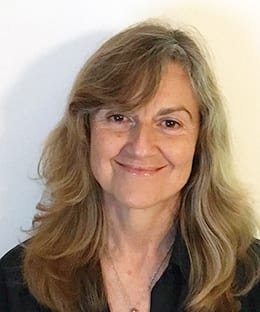
Monica Ferraris
Director
Alexandra Navrotsky, DLM, FACerS
Regents Professor, School of Molecular Sciences and School for Engineering of Matter, Transport, and Energy
Director, Navrotsky Eyring Center for Materials of the Universe
Arizona State University
Tempe, Ariz.
I have been a member of The American Ceramic Society since the early 1970s, publishing regularly in the journals and attending many of our meetings. I balance interests in ceramics, solid-state chemistry, materials science, mineralogy, and Earth and planetary science. These interests are tied together by my passion for and research in thermodynamics.
I continue to have a very active research program, having moved from the University of California, Davis, to Arizona State University in 2019. I lead ASU’s Center for Materials of the Universe, and I am an active member of FORCE, the Facility for Open Research in a Compressed Environment, which brings unique new high-pressure capabilities to the United States.
The Society has honored me with Fellowship and, more recently, Distinguished Life Membership, as well as the Spriggs and Kingery Awards. More importantly to me, it has continually provided a forum for new interdisciplinary science—its inception, execution, and publication.
If elected to the Board, I will strive to sustain and broaden this forum. ACerS is a relatively small society, especially when compared to organizations like the Materials Research Society or the American Chemical Society. But this smallness makes us a close-knit group of colleagues and friends with a well-defined focus on ceramic materials, ranging from basic to applied and back again.
Though we need to stem attrition, our moderate size makes ACerS a comfortable place for new and younger members and for immigrants (both from different countries and from different fields of knowledge). I contend that a flexible and multidisciplinary approach attracts unconventional people, including those from underrepresented groups. We must augment this natural advantage with specific programs to attract students at all levels, professionals, and life-long-learners. These programs can be at our national meetings, at local Sections and Chapters, in student affiliate organizations, and as individual outreach. We need better communication but also more creativity.
If elected, I will take advantage of my wide reach of contacts and collaborators to bring new ideas to the table.
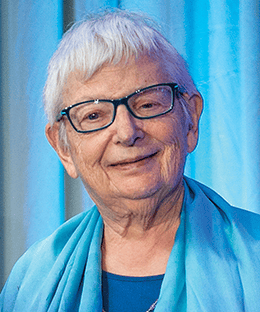
Alexandra Navrotsky
Director
Dileep Singh, FACerS
Argonne Distinguished Fellow
Senior scientist and group leader of thermal and structural materials in the Applied Materials Division
Argonne National Laboratory
Lemont, Ill.
It is an honor and privilege to be nominated to the Board of Directors of The American Ceramic Society.
I joined ACerS as a graduate student in 1986, and I have immensely benefited from the Society in my professional and personal growth over the past several decades. By serving on the Board, I would like to help ACerS continue providing high-quality experiences to the next generation of scientists and engineers and the worldwide ceramics community at large.
Having served on numerous Society-level committees, I have had fruitful interactions with my peers from around the world as well as the dedicated ACerS staff. As part of the Engineering Ceramics Division leadership, I have been fortunate to organize some of the most successful ACerS international conferences (PACRIM, ICACC) on advanced ceramics and initiate new focus areas (such as energy storage) at ICACC, which have blossomed into successful stand-alone symposia. I sincerely believe that my experience will be a positive addition to the ACerS Board and benefit the Society.
If elected, my goal will be to address several current and upcoming challenges the Society faces by working alongside the ACerS leadership in a proactive manner. Some key priorities for me include enhancing membership growth and experience by broadening our membership diversity and mentoring early career members; maintaining high-quality technical content by rapidly addressing emerging areas through our publications and conferences; and ensuring a stable fiscal base for the Society by taking strategic decisions. I plan to work diligently with my Board colleagues to ensure a strong future for ACerS.
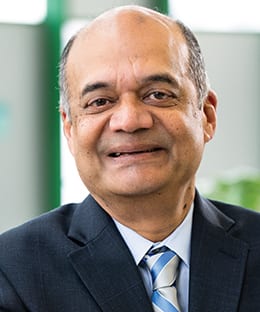
Dileep Singh
Director
Todd Steyer, FACerS
Chief engineer for materials and manufacturing R&D
The Boeing Company
Huntington Beach, Calif.
As a lifelong learner and 35-year member of ACerS, I am excited by the role that ACerS plays in shaping the future of our field as a resource for a growing member base.
I am currently chief engineer for materials and manufacturing R&D at The Boeing Company, Huntington Beach, Calif. I earned a B.S. in metallurgical engineering & materials science from Carnegie Mellon University, Pittsburgh, Pa., and Ph.D. in materials science and engineering from Northwestern University, Evanston, Ill.
An ACerS Fellow, I am a member of the Basic Science Division, Engineering Ceramics Division, Southern California Section, and am a past chair and two-term trustee of ACerS Ceramic and Glass Industry Foundation.
Having joined ACerS as a graduate student, ACerS membership provided me with networking and opportunities to present and publish my research. While getting started in industry, I referenced the ceramicSOURCE Buyer’s Guide for suppliers/vendors. Organizing the aerospace track for ICC-4 (4th International Ceramics Congress) strengthened my ties to ACerS, so I was happy to join CGIF as a trustee in 2017. Through CGIF, I enjoyed seeing what our pooled resources can do for our field and in the lives of people that the Foundation reaches through the generosity of our donors.
With your support, as a director, I pledge to promote ceramics and glass professions, help build a talent pipeline for our field, and strengthen our Society, Divisions, Sections, and International Chapters by emphasizing our Society’s strengths: networking and information.
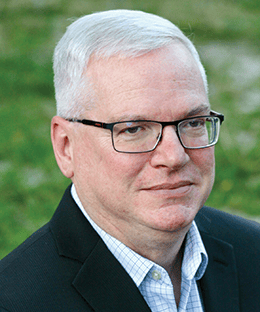
Todd Steyer
2023–2024 ACerS officers
The new slate of ACerS officers has been determined. There were no contested offices and no write-in candidates, automatically making all nominees “elected.” ACerS rules eliminate the need to prepare a ballot or hold an election when only one name is put forward for each office. The new term will begin Oct. 4, 2023, at the conclusion of ACerS Annual Meeting at MS&T.
ACerS President-elect
To serve a one-year term from Oct. 4, 2023, to October 2024
Monica Ferraris
ACerS Board of Directors
To serve three-year terms from Oct. 4, 2023, to October 2026
Alexandra Navrotsky
Dileep Singh
Todd Steyer
Division and Class Officers
To serve a one-year term Oct. 4, 2023, to October 2024, unless otherwise noted
Energy Materials and Systems Division
- Chair: Eva Hemmer
- Vice chair: Yang Bai
- Secretary: Charmayne Lonergan
- Program chair: Jianhua Tong
- DEI representative: Marissa Riegel
Engineering Ceramics Division
- Chair: Young-Wook Kim
- Chair-elect: Jie Zhang
- Vice chair/Treasurer: Amjad Almansour
- Secretary: Federico Smeacetto
- Trustees: Valerie Wiesner and Palani Balaya
- Parliamentarian: Manabu Fukushima
- DEI representative: Federico Smeacetto (2022–23)
Glass & Optical Materials Division
- Chair: Irene Peterson
- Chair-elect: Michelle Korwin-Edson
- Vice chair: Mathieu Bauchy
- Secretary: TBD
- DEI representative: Jose Marcial
Manufacturing Division
- Chair: Joseph Szabo
- Chair-elect: Sarah Whipkey
- Vice chair: Bai Cui
- Secretary: TBD
- Counselor: William Carty
- DEI representative: Manoj K Mahapatra
Refractory Ceramics Division (term begins March 2023)
- Chair: Robert Hunter
- Vice chair: Austin Scheer
- Secretary: John Waters
- Program chair: Brett Ervin
- Trustee: Dana Goski
- DEI representative: Angelo Cristante
Structural Clay Products Division
- Chair: Jim Krueger
- Chair-elect: Bryce Switzer
- Vice-chair: Mike Rixner
- Secretary: TBD
- Trustee: Jed Lee
Art, Archaeology & Conservation Science Division
- Chair: Christina Bisulca
- Vice chair: Fumie Iizuka
- Secretary: Tami Clare
- Treasurer: Xiao Ma
- Trustee: Darryl Butt
- DEI representative: Christina Bisulca
Basic Science Division
- Chair: Edwin García
- Chair-elect: Amanda Krause
- Vice chair: Ricardo Castro
- Secretary: Fei Peng
- Secretary-elect: Ming Tang
- DEI representative: Victoria Blair
Bioceramics Division
- Chair: Kalpana Katti
- Chair-elect: Annabel Braem
- Vice chair: Hrishikesh Kamat
- Secretary: Ashutosh K. Dubey
- DEI representative: TBD
Cements Division
- Chair: Wil V. Srubar III
- Chair-elect: Prannoy Suraneni
- Secretary: Alex Brand
- Trustee: Matt D’Ambrosia
- DEI representative: Kendra Erk
Education and Professional Development Council
- Co-chair: Steven Naleway (2022–2024)
- Co-chair: Brian P. Gorman (2023–2025)
Electronics Division
- Chair: Ed Gorzkowski
- Chair-elect: Matjaz Spreitzer
- Vice chair: Mina Yoon
- Secretary: Reeja Jayan
- Secretary-elect: Aiping Chen
- Trustee: Geoff Brennecka
- DEI representative: Brady Gibbons
Volunteer spotlight
ACerS Volunteer Spotlight profiles a member who demonstrates outstanding service to the Society.
Kelley Wilkerson is assistant teaching professor in the Department of Materials Science at Missouri University of Science and Technology. Her primary focus includes hands-on laboratory experiences at the undergraduate level. She received her bachelor’s degree in ceramic engineering (2007) and Ph.D. in materials science (2012) from Missouri S&T. Prior to entering academia, she began her career at Allied Mineral Products working in the refractories industry.
In addition to teaching, Wilkerson has a passion for service and volunteerism. Since starting her teaching career in 2018, she has included service as a critical element of each course with the hope of inspiring students to have a passion for giving back to their community. She also serves the local community by providing STEM outreach events to K–12 students.
A member of The American Ceramic Society since 2007, Wilkerson has held several volunteer positions, including serving on the Strategic Planning and Emerging Opportunities Committee and the Bulletin Editorial Advisory Board. She has chaired multiple sessions at MS&T, and most recently served as chair of the Refractory Ceramics Division. Wilkerson has also been a part of the National Keramos Board.
We extend our deep appreciation to Wilkerson for her service to our Society!
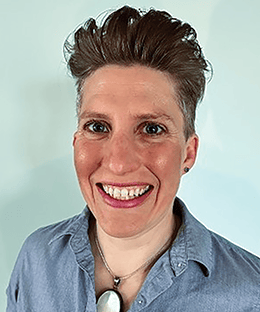
Kelley Wilkerson
Names in the news
Members — Would you like to be included in the Bulletin’s Names in the News? Please send a current head shot along with the link to the article to mmartin@ceramics.org. The deadline is the 15th of each month.
Edgar Dutra Zanotto, FACerS, received the prestigious Brazilian Confederation of Research Support Foundations Award in Science, Technology, and Innovation, as Outstanding Researcher in the Exact Sciences. Zanotto is professor of materials engineering at Federal University of São Carlos, Brazil, and director of CeRTEV. The award recognizes contributions to relevant scientific, technological, or innovative knowledge that converted into benefits for the development and well-being of the Brazilian population.
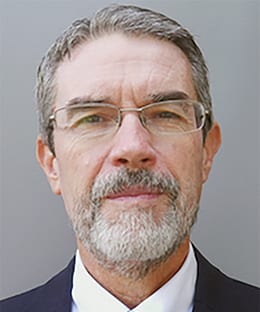
Edgar Dutra Zanotto
In Memoriam
- Rodney Bagley
- Charles Connors
- John “Jack” Wachtman
Some detailed obituaries can also be found on the ACerS website.
ACerS Carolinas Section 2023 Annual Meeting
The annual meeting of the ACerS Carolinas Section was held March 30, 2023, at the Advanced Materials Research Lab, Clemson University, S.C.
The student poster winners were
First place co-winners
- Mary-Ann Cahoon, Clemson University
Thermal evolution of Yb-doped BaF2 nanoparticles for silica optical fiber - Ningxuan Wen, Clemson University
Reinforcement learning-based inverse design on thermal metamaterial
Second place co-winners
- Xiao Geng, Clemson University
Machine learning-based, inverse microstructure prediction from hardness for laser-sintered alumina - Xin Wang, University of Tennessee, Knoxville
Phase selectivity and stability in compositionally complex nano (Al1/n)Co2O4 - Sujithra Chandrasekaran, University of North Carolina, Charlotte
Effect of concentration of NaOH on density and strength of SiC at high compact pressure
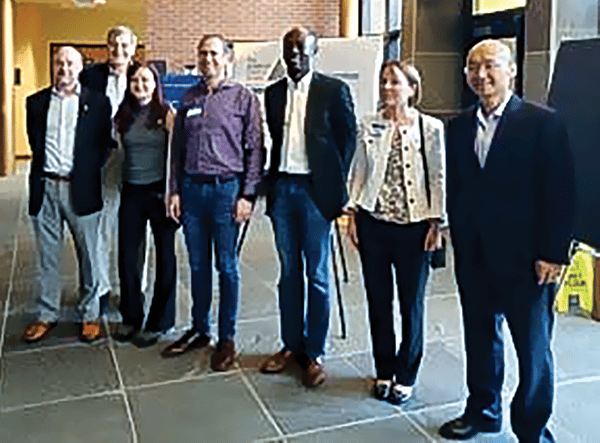
Members of the Carolinas Section leadership at the March 30, 2023, Annual Section Meeting. From left: Charles Lakeman, Ed Fuller, Taylor Barrett-Crvich, Jacob Jones, Divine Kumah, Cheryl Brayman, and Fei Peng.
New Jersey/New York Metro/Philadelphia Section hosts inaugural event, 2023 Malcom G. McLaren Lecture Symposium
The New Jersey/New York Metro/Philadelphia Section, along with the Rutgers Department of Materials Science and Engineering and the Ceramics Association of New Jersey, hosted the Malcom G. McLaren Lecture Symposium on March 30, 2023.
This annual event recognizes a distinguished member of the ceramics community. This year, the awardee was Benjamin V. Fasano, recently retired from IBM. Fasano gave the McLaren Lecture on the topic of “Advances in microelectronic packaging over the past 40 years.”
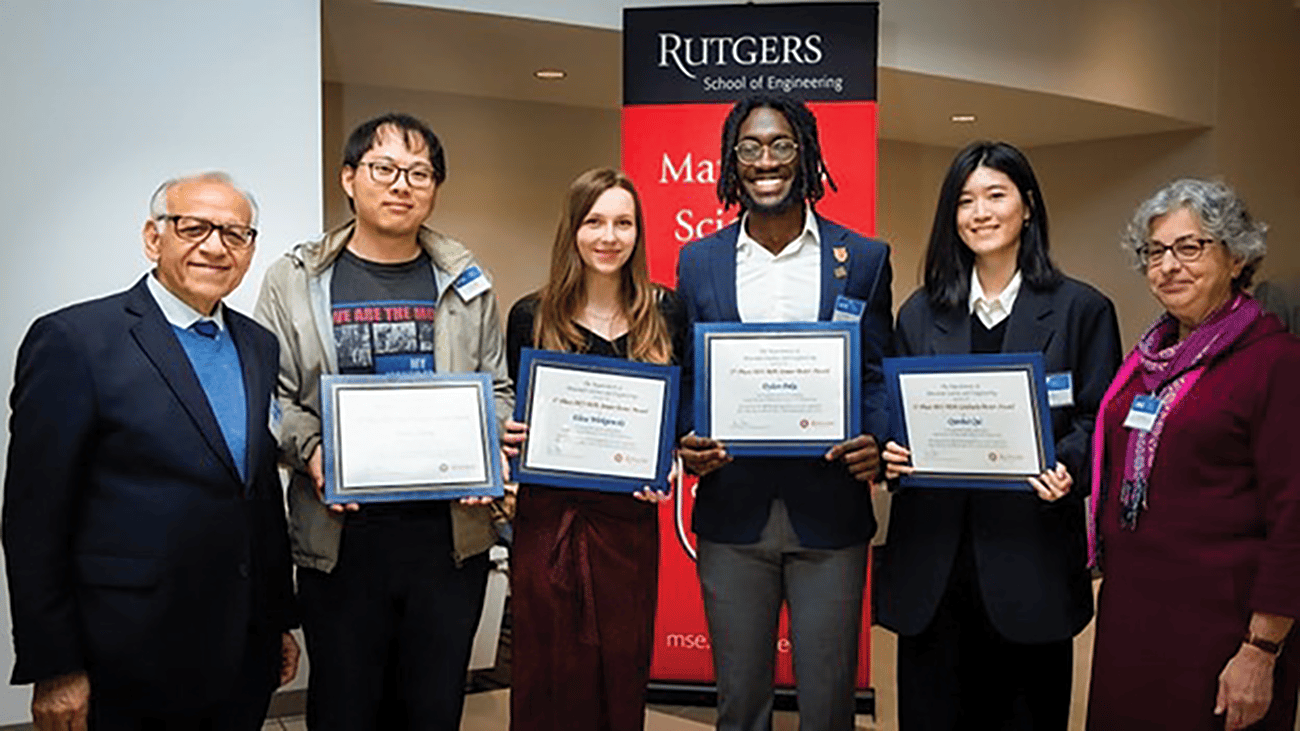
Ahmad Safari (left), president of the Ceramic Association of New Jersey, and Lisa Klein (right), chair of the New Jersey/Metro New York/Philadelphia Section, with student winners at the 2023 Malcom G. McLaren Lecture Symposium.
Taiwan Chapter hosts second Taiwan–Japan workshop on powder processing technologies for high-quality products
The second Taiwan–Japan workshop on powder processing technologies was organized by Wei-Hsing Tuan of National Taiwan University and M. Naito of Osaka University. Several members of The American Ceramic Society attended the workshop, which was held March 9, 2023.
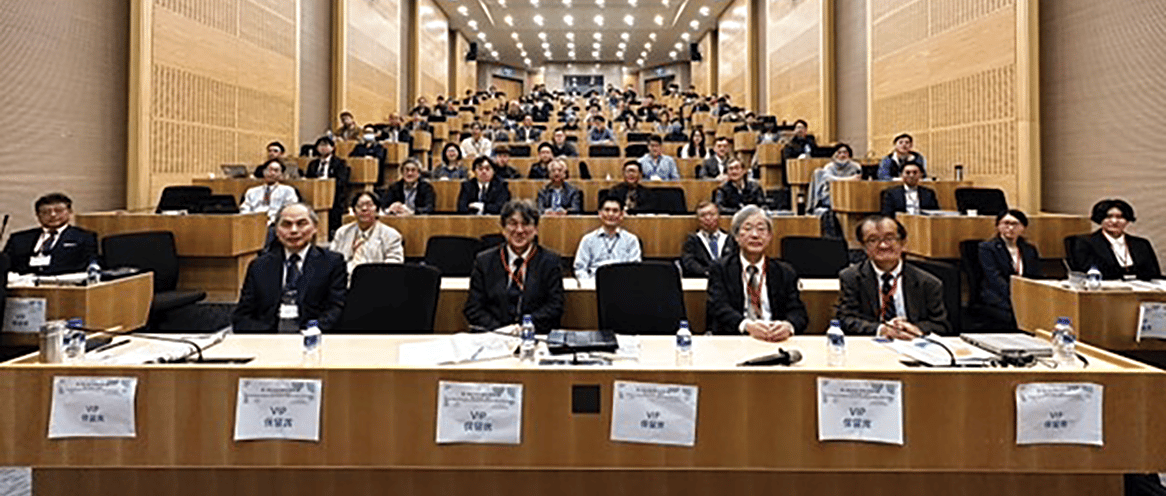
Attendees at the second Taiwan–Japan workshop on powder processing technologies.
Germany Chapter hosts workshop on lithium storage strategies
The Germany Chapter hosted a workshop on March 21, 2023, featuring Yuki Yamada, Tohru Sekino, and Yu Katayama, who are all affiliated with the Institute of Scientific and Industrial Research at Osaka University, Japan.
The researchers’ respective areas of expertise include electrochemistry, solution chemistry, solid/liquid interfaces, nanomaterials science, ceramics, hyper-functionalized materials, materials chemistry, catalysis, and energy storage and conversion. The main focus of the workshop was advances in lithium storage strategies.
Awards and Deadlines
For more information: ceramics.org/members/awards
Nominations for Division Awards
- Deadline: Nomination deadlines for Division awards are July 1, July 31, and Aug. 4, 2023.
- Contact: Karen McCurdy
Nominations for Society Awards
- Deadline: Nomination deadline is Sept. 1, 2023.
- Contact: Email Erica Zimmerman or call 614.794.5821.
Students and Outreach
For more information: ceramics.org/resources-for-students
ACerS Young Professionals Network offers monthly YPN Connect events
Join fellow young professionals at YPN Connect. These monthly virtual networking events are open to both ACerS YPN members and nonmembers, so be sure to invite your colleagues and friends!
Register by visiting www.ceramics.org/ypn so that we may send you the connection details. We look forward to seeing you there.
ACerS GGRN—graduate student membership for ceramics and glass students
Build an international network of peers and contacts within the ceramics and glass community with ACerS Global Graduate Researcher Network.
ACerS GGRN is a membership in ACerS that addresses the professional and career development needs of graduate-level research students who have a primary interest in ceramics and glass.
GGRN members receive all ACerS individual member benefits, plus the opportunity to attend special events at meeting and access to free webinars on targeted topics relevant to the ceramics and glass graduate student community.
ACerS GGRN is only $30 per year. If you are a current graduate student focusing on ceramics or glass, visit www.ceramics.org/ggrn to learn what GGRN can do for you and to join directly.
ACerS resources for students are at your fingertips!
ACerS offers an abundance of opportunities for students. For those who are focusing on ceramics and glass, ACerS can help them earn recognition, gain access to the latest technical information, and build the networks necessary for success.
Learn more about the following resources for students.
- Awards and scholarships
- Financial support
- Student Mentor Program
- Learning Center
- Job Search Resource Center
- …and more!
Material Advantage student program
The Material Advantage student program was created for undergraduate and graduate students enrolled in materials science, engineering, and other technical engineering programs at universities around the world. The program offers a single membership fee of $30 and provides access to four distinguished materials science and engineering professional societies: The American Ceramic Society (ACerS), The Association for Iron and Steel Technology (AIST), ASM International, and The Minerals, Metals, and Materials Society (TMS). Join today.
From PCSA to industry leaders
The President’s Council of Student Advisors (PCSA), fresh from their autumn annual board meeting, hums with excited energy as a new year begins. With a recently elected chair and visions for change, the PCSA readies itself to help even more students in the ceramics and glass community.
The PCSA primarily serves The American Ceramic Society, but according to PCSA chair Fox Thorpe, a Ph.D. student at the University of California, Davis, it really is a group that helps other students.
“Largely, I think we’re a group focused on serving students, and so that’s the biggest reason to support the PCSA,” Thorpe says.
The PCSA has five committees: Conference Programming and Competitions, Communications, Recruitment and Retention, Education, and Professional Development. The Education and Professional Development Committees are new this year, originating out of a reorganization at the PCSA Annual Business Meeting in October 2022.
Overall, for this year, the PCSA’s main goals are to increase international reach and improve support for young professionals in the ceramics and glass community. One way the PCSA aims to achieve these goals is by recognizing the importance of retaining members in ACerS after they are no longer students. As such, the PCSA has plenty of opportunities for alumni to come back and volunteer.
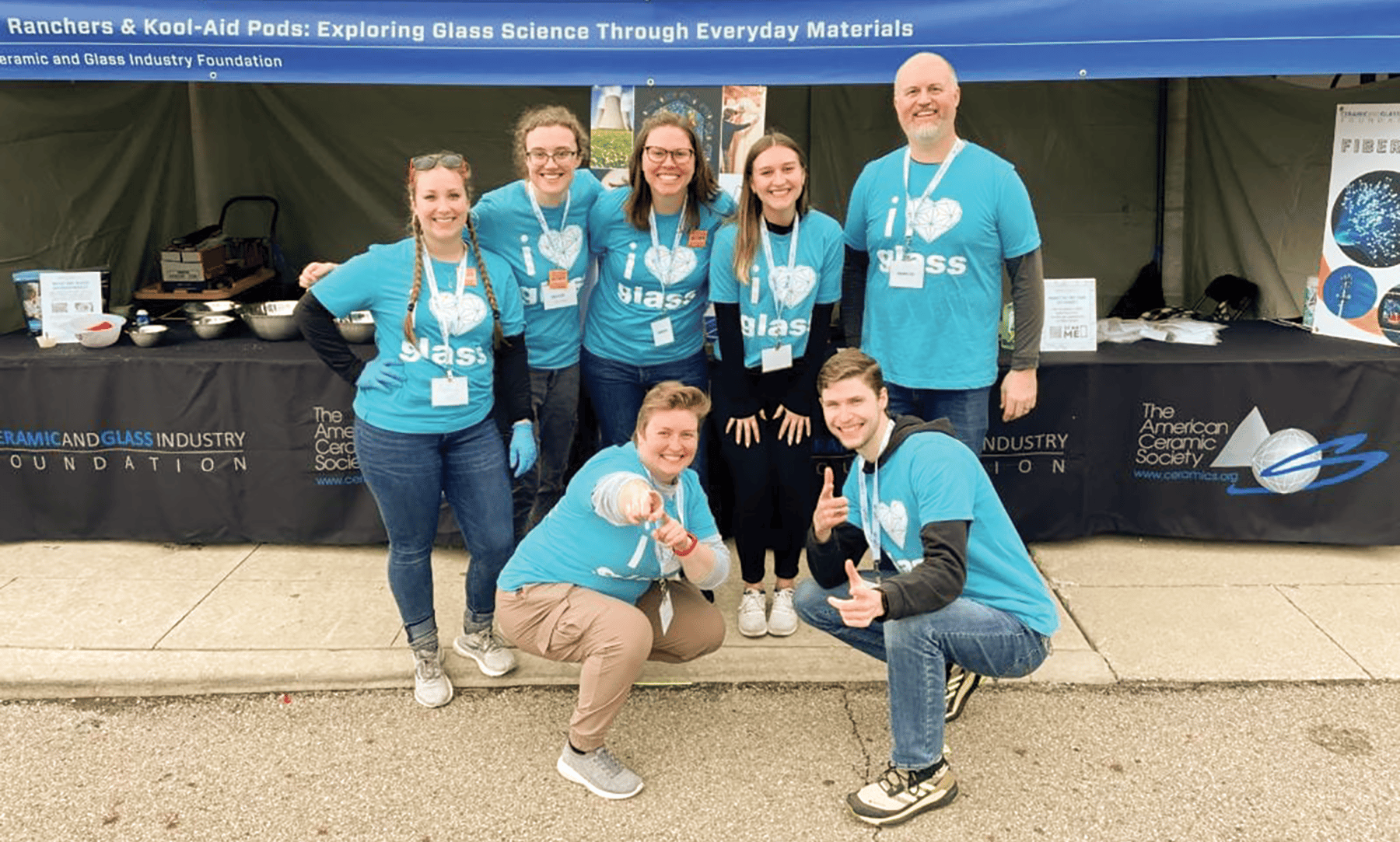
PCSA students and CGIF staff introduce the new Glass Science Kit at the Center for Science and Industry in Columbus, Ohio. Front row from left: Brittney Hauke and Nathan McIlwaine. Back row from left: Aubrey Fry, Olivia Brandt, and CGIF staffers Amanda Engen, Helen Widman, and Marcus Fish.
ACerS member Kristen Brosnan served as an industrial mentor for the PCSA in 2010. At the time, Brosnan worked at GE Research, and she attributes her connections to ACerS and the PCSA as opening more opportunities for her career.
“I didn’t volunteer with the PCSA to get anything back. Personally, that was not the goal,” Brosnan says. “I wanted to have fun and give back. And I will say it absolutely benefited my career.”
Brosnan is now associate director of research and development at Collins Aerospace. One of her favorite memories about the PCSA is the Annual Business Meeting, when all the student delegates meet in person for networking, collaborating, and bonding.
“It is so energizing, like it literally was the pick-me-up of the year for me because these are the future leaders, and it is just so energizing to see that much energy and passion in the room,” Brosnan says. “Who can’t get excited about that?”
For Thorpe, the benefits of the PCSA have extended even further than just professional development.
“I joined the ceramics community with zero network, with zero knowledge, and pretty much like nothing that I knew about materials science,” he says. “It’s been really good to have people to ask about jobs, internships, postdocs, just having a group of people who are studying the same things and have an interest in similar opportunities.”
The continued success and impact of the PCSA would not be possible without the support of donors who see the value in building a network of future ceramics and glass professionals.
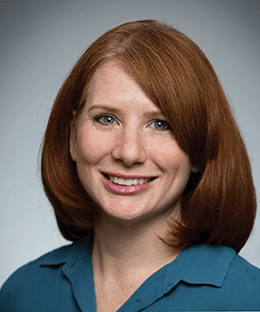
Kristin Brosnan

